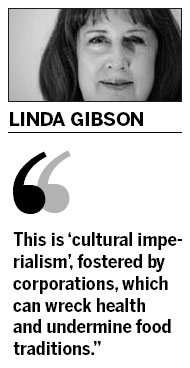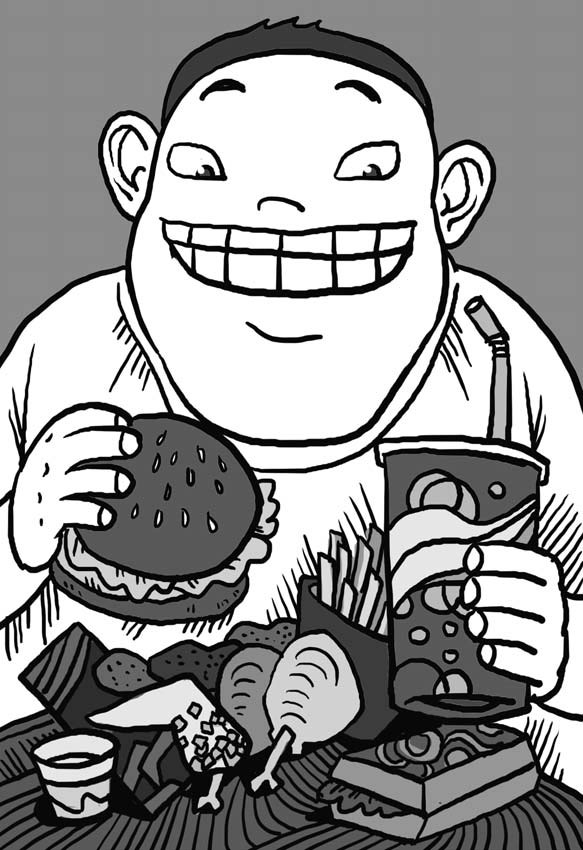Linda Gibson
Fat food invasion is sparking growth in childhood obesity
By Linda Gibson (China Daily)
Updated: 2010-07-01 14:47
 |
Large Medium Small |

Of all the products exported by the United States, few have been as successful or as dangerous to people's health as fast food.
In fact, whenever I see a golden arch or the bearded grin of a KFC colonel anywhere overseas, it makes me cringe. These are not the kinds of products I want people to associate with my country.
Now comes the news that up to one-fifth of Chinese children are too pudgy for their own good. The main culprits are thought to be grandparents who indulgently overfeed their children's offspring, especially by taking them to fast-food chains.
These elderly caretakers probably remember all too well when China didn't have enough food and it had to be rationed. When these elderly people were the same age as their grandchildren, a piece of meat was a rare treat reserved for special occasions and an extra dumpling was something to get excited about.
So it must give them a special thrill to be able to watch their grandchildren happily stuffing themselves with high-fat meat products and super-sweetened drinks.
What they probably don't know is that one fast-food meal can equal half the calories a child should consume in an entire day. That's something fast-food advertising never mentions.
They probably also don't know that weight gains caused by fast-food meals can result in diseases that shorten their grandchildren's lives. Each mouthful, while packing excess pounds onto young bodies, is one more step toward diabetes, high blood pressure or heart disease.
Kids get hooked on fast food. There are adults in the United States, people old enough to know better, who eat fast food every day - sometimes for more than one meal a day. The 2004 documentary film, Supersize Me, which was nominated for an Academy Award, superbly illustrated the result.

Chinese children could be spared from a lot of future fat angst if their grandparents would only watch this movie.
In it, Morgan Spurlock eats at a McDonald's outlet every day for a month. He tries to sample everything on the menu at least once. He starts the month as a healthy 32-year-old standing 6 feet 2 inches tall and weighing a fit 185 pounds.
After 21 days, doctors warned him to stop his experiment, but he persisted. By the end of the month, he had gained 25 pounds and suffered depression, lethargy, headaches, loss of muscle mass, a low sex drive and irreversible heart damage. It took him 15 months to lose the excess weight he had gained in 30 days.
This is "cultural imperialism," fostered by corporations, which can wreck health and undermine food traditions. Look what it's done to Americans and their children.
About one-third of American kids are overweight and among those, 17 percent are obese - extremely fat. Among adults, 68 percent are overweight and of those, 32 percent are obese.
Not all of this can be blamed on fast food, but it is a big contributing factor.
What the United States needs is a Chinese alternative to fast food. The Chinese way of eating is theoretically healthier - small portions of a variety of dishes leisurely shared with companions, instead of each diner quickly consuming massive individual portions containing too much starch, meat, sugar and salt.
Maybe it's too much to hope that a Chinese restaurant company manages to flood the United States with outlets selling hand-pulled noodles and freshly made dumplings.
But we can all hope that Chinese parents and grandparents learn the dangers of what should be called "fat-food" so their children and grandchildren don't suffer the consequences of well-meant but harmful treats.